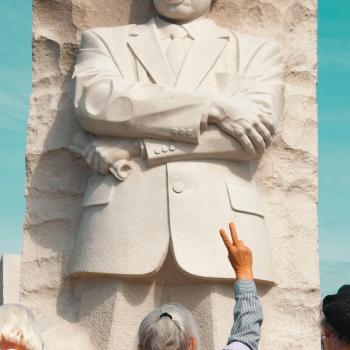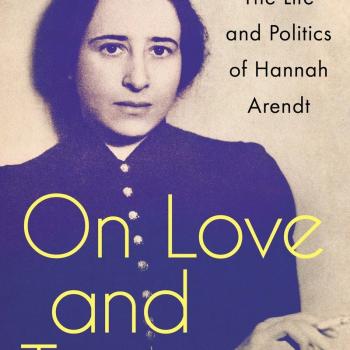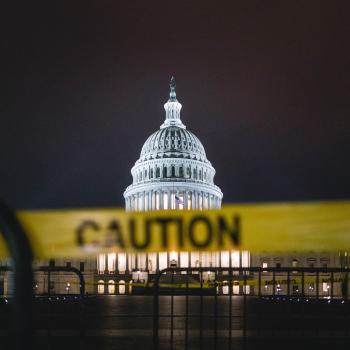This week we prepare for a Thanksgiving season unlike any other. Covid-time is changing the landscape for the traditional dinners and reunion–at least, for many Americans. Just in time for our holiday, a brand new book looks at the historical roots of the holiday and the founding of our nation, and how both have changed over the years. With this changing landscape of Covid-time, perhaps we can find some time to consider changing our views of a complex and distant past.
Abram Van Engen is Associate Professor of English at Washington University in St. Louis and the author previously of the another excellent volume on early America, Sympathetic Puritans. Prof. Van Engen has now published this latest book with Yale University Press, titled City on a Hill: A History of American Exceptionalism. Another review of this book appeared recently in Patheos at the Anxious Bench: (see the Anxious Bench Q&A here). There, the authors write: “The book begins with a careful examination of what has become the most famous sermon in American history. Then, Van Engen moves from the seventeenth century to the present, examining how many Americans have made use of the Puritan in attempts to define their country’s meaning.”
If you are a fan of American history and the way our ideas about meaning and purpose have been shaped over the years, I highly recommend City on a Hill. The review mentioned above is a great place to begin thinking about some of the issues raised; here I’d like to go beyond that interview to talk about City on a Hill in relation to Covid-time 2020, and specifically during this Thanksgiving Week, as we celebrate our American origins and think deeply about the legacy of our shared history.
Q: First: Talk about the process of writing this book; how long did it take? How many archives did you visit? Where is the genesis of this project? And why is it important now, in 2020?
AVE: This book began from my discovery, while writing Sympathetic Puritans, that Winthrop’s “city on a hill” sermon went almost entirely unknown in its own day. I wanted to know how and why and when it eventually became so famous and considered so foundational. Originally, I thought I’d write a short, simple book about just the text, but every rabbit hole along the way seemed worth exploring and the project expanded into a history of American exceptionalism more generally.
To give just one example: I knew Winthrop’s sermon was found in the New York Historical Society and published by the Massachusetts Historical Society, but then I wanted to know why these societies existed at all. And that led to some startling finds about the role of American exceptionalism. The founder of the MHS never knew about Winthrop’s “city on a hill” sermon, for instance, but he did think of America as a “city on a hill,” and he preached a sermon on the topic (now in his manuscripts at the MHS). So the historical society he founded, believing in a certain story about America, eventually published the main text that would tell that story during the Cold War. There is often a circular relation between the stories that shape our archives and the shape of the stories our archives produce.
Sorting through those archives was my favorite part of this project. I spent a great deal of time at the MHS, which has an amazing collection and a lovely reading room. I also read through all of Perry Miller’s papers at Harvard, spent days collecting old history textbooks at the Gutman Library, traveled to the Emma Willard school and read through all her old letters, and of course visited the New York Historical Society to see the one copy of Winthrop’s sermon that survives.
I worked on the book off and on for eight years. During those years, I was fortunate enough to win two fellowships from the National Endowment for the Humanities and one internal fellowship from Wash U, so in the end I had four semesters without teaching just to research and write. During that time I did the bulk of the reading, writing, and travel, and I have a file of notes for every citation.
Q: The previous interview ended with a comparison between older forms of American exceptionalism vs. Trumpian appeals to “America First.” Can you say more about your sense of how Americans have lost their historical imagination?
AVE: I began this book in 2012 or so, when Donald Trump was just a reality TV star. It was a different era, and I could not have foreseen how the book would change as I finished it. In the book, I try to capture how radically that idea of American exceptionalism was left behind by the rhetoric of Donald Trump, and how in many ways it moved left and reshaped the language of the left. But apart from recent shifts, I hope the book will be of enduring relevance for thinking through the way origin stories and national histories shape present-day conceptions of the country—with real effects on domestic and foreign policy.
As for our current historical imagination, I think the question cuts two ways. On the one hand, Donald Trump replaced Ronald Reagan’s clear story of immigration, asylum, and the Pilgrim founding of a model for all the world to see with a vague sense that we were once (sometime, somehow, never explained) “great.” There was no story to America First. Historical imagination thinned. On the other hand, we have simultaneously seen almost too much imagination reshaping origin stories into whatever we want them to be. Many around Trump have decided that the best way to save and secure the nation is to baptize and sanctify the founding. In response, competing origin stories square off with each other—the 1619 Project against the 1776 Commission and the recent creation of the 1620 Project aimed at reestablishing Pilgrims as America’s true founders. It’s a mess. But it reiterates one of the central points in my book: in America, so much depends on an origin story. We use singular origin stories to explain and address almost all of American history.
Q: Can you say more about the problem with looking to the Pilgrims and Puritans as America’s primary founders, especially in the context of 2020?
AVE: Consider some basic facts: the Native Americans had been here for over 12,000 years; the Spanish had been here for decades before the Pilgrims; the Dutch and the French also came earlier; other English explorers scoped out the Atlantic seaboard long before (with devastating consequences); and the first permanent English settlement was Jamestown. So why would we say the Pilgrims are our founders?
We can say that only if we want to hide the rest and highlight something about the Pilgrims we admire. Doing so has a long history. By not talking about Jamestown, for example, Americans have historically allowed a story of the Pilgrims to establish America as the land of freedom, not slavery. Ignoring the ignoble parts of the Pilgrims’ and Puritans’ own slaveholding past, we set our sights on a story we would like to be true. And in the process, the horrors of the American past are subsumed. They are considered mere glitches or bumps along the way, instead of being as central to the story of America as liberty.
The problem with calling the Pilgrims our founders, in short, is that we tend to have a limited view not just of America but also of the Pilgrims themselves.
Q: As we enter into Thanksgiving weekend, which is often premised on the early American scenes of the Pilgrims, what can you suggest in terms of how your work helps us recover a truer sense of our nation’s beginnings?
AVE: The difficulty we face at Thanksgiving is that we need nuance, and pop culture is not particularly good at nuance. We have myths which praise the Pilgrims as the founders of liberty and myths that condemn them as genocidal maniacs. The true story lies between. I do think the Pilgrims and Puritans had important ideas about liberty. At the same time, we need to understand how even the most exalted ideas are held by human beings who sin and fall short of the glory of God—sometimes even demonizing and dehumanizing those around them, whatever they profess to believe.
As it relates to the Pilgrims and to American history more generally, therefore, Thanksgiving must be a time for both gratitude and mourning. Honestly, it would be easier if we had a national holiday every year devoted to repentance. The Pilgrims and Puritans themselves insisted on national days of Fasting and Thanksgiving, the first for mourning our sins and the second for gratitude to God. It seems, as a culture, that we took the second and lost the first, and our sense of American history, as a result, is out of balance.
Q: More broadly: how does being a Christian inform your own approach to history?
AVE: I once had a professor at Calvin University tell me to write about people in the past with the knowledge that I might meet them face to face. If I were to believe that fully—as I do—then it requires me to treat historical persons in a way I will have to answer for later. Past actors are not pawns or playthings in whatever story I want to tell. They are human beings, ends in themselves, deserving of respect even when I condemn the actions they took.
In short, I think my faith calls on me to be generous and loving without being blind or naïve. I don’t always achieve that balance, but that balance remains my aim.















